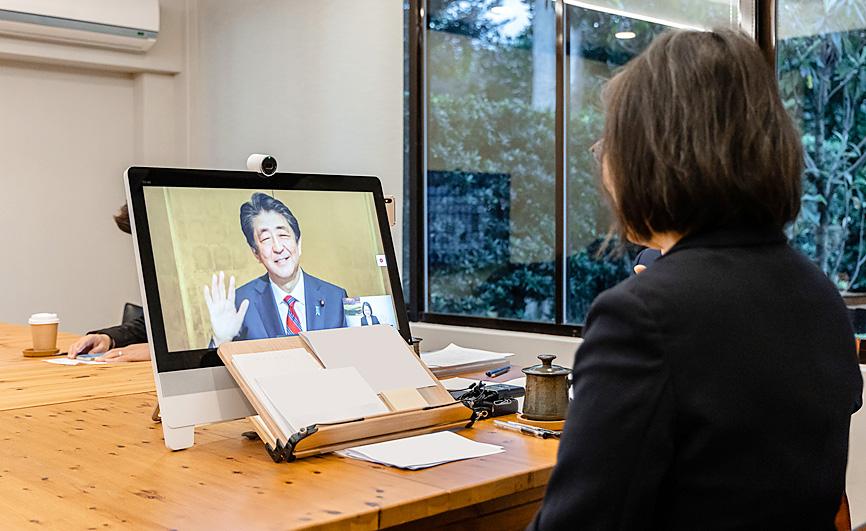Former Japanese prime minister Shinzo Abe called for closer Japan-Taiwan ties by overcoming diplomatic and professional barriers in his first videoconference with President Tsai Ing-wen (蔡英文) on Tuesday night.
Tsai said there are many opportunities for the two nations to collaborate, as Taiwan strives for common goals with like-minded countries such as Japan and the US.
The two also discussed the situation in Ukraine and the Indo-Pacific region.

Photo courtesy of the Presidential Office via CNA
The Presidential Office said the bilateral talk last nearly 30 minutes and was part of an annual meeting of the Japan-ROC Diet Members’ Consultative Council, a cross-party Japanese parliamentary group comprising about 270 members.
At the beginning of their discussion, a full video of which was released by the Presidential Office yesterday, Tsai said she was delighted to meet with Abe virtually as they used to only talk by telephone.
The president thanked Japan for donating vaccines to Taiwan last year during a local outbreak of COVID-19.
Abe thanked Taiwan for its help after a massive earthquake struck Japan on March 11, 2011, and for donating medical supplies during the COVID-19 pandemic.
Tsai said that Taiwan had followed the lead of other countries in allowing the importation of food products banned following the 2011 Fukushima Dai-ichi nuclear power plant disaster, showing its determination to remove trade barriers between the two countries.
Taiwan and Japan should join hands to bolster the economic power of the Indo-Pacific region, as economic growth is crucial to a nation’s stability, she added.
Regarding Taiwan’s bid to join the Comprehensive and Progressive Agreement for Trans-Pacific Partnership (CPTPP), Abe said he hoped that Taiwan would meet its high standards and join the bloc soon.
The CPTPP was established by Japan with 10 other countries when Abe was prime minister and is expanding by adding new members.
Regarding the situation in Ukraine, Tsai said that Taiwan had imposed sanctions against Russia and provided humanitarian aid to Ukraine, adding that Taiwan would stand side-by-side with Ukraine, and uphold the values of democracy and freedom.
Abe said Russia’s invasion was a serious challenge to the international order, adding that Japan should cooperate with other countries in pressuring Moscow into a ceasefire and withdrawal.
Echoing Abe’s comments, Tsai condemned Russia for unilaterally changing the “status quo” and infringing on the rights of a democratic country, which must not be allowed in the Indo-Pacific region.
Tsai also thanked Japan for emphasizing the importance of stability across the Taiwan Strait at international events, saying that she hoped the two sides can maintain peace in the region.
Abe advocated for a free and open Indo-Pacific region, whose “status quo” is protected by international law and not altered by military force.
“It is important for Japan and Taiwan to share intelligence to keep the region stable,” Abe said.
Abe expressed his hope to visit Taiwan soon to exchange ideas with the president, who said she looked forward to greeting him in person.
Additional reporting by CNA

The Central Election Commission has amended election and recall regulations to require elected office candidates to provide proof that they have no Chinese citizenship, a Cabinet report said. The commission on Oct. 29 last year revised the Measures for the Permission of Family-based Residence, Long-term Residence and Settlement of People from the Mainland Area in the Taiwan Area (大陸地區人民在台灣地區依親居留長期居留或定居許可辦法), the Executive Yuan said in a report it submitted to the legislature for review. The revision requires Chinese citizens applying for permanent residency to submit notarial documents showing that they have lost their Chinese household record and have renounced — or have never

A magnitude 5.6 earthquake struck off the coast of Yilan County at 12:37pm today, with clear shaking felt across much of northern Taiwan. There were no immediate reports of damage. The epicenter of the quake was 16.9km east-southeast of Yilan County Hall offshore at a depth of 66.8km, Central Weather Administration (CWA) data showed. The maximum intensity registered at a 4 in Yilan County’s Nanao Township (南澳) on Taiwan’s seven-tier scale. Other parts of Yilan, as well as certain areas of Hualien County, Taipei, New Taipei City, Taoyuan, Hsinchu County, Taichung and Miaoli County, recorded intensities of 3. Residents of Yilan County and Taipei received

Taiwan has secured another breakthrough in fruit exports, with jujubes, dragon fruit and lychees approved for shipment to the EU, the Ministry of Agriculture said yesterday. The Animal and Plant Health Inspection Agency on Thursday received formal notification of the approval from the EU, the ministry said, adding that the decision was expected to expand Taiwanese fruit producers’ access to high-end European markets. Taiwan exported 126 tonnes of lychees last year, valued at US$1.48 million, with Japan accounting for 102 tonnes. Other export destinations included New Zealand, Hong Kong, the US and Australia, ministry data showed. Jujube exports totaled 103 tonnes, valued at

BIG SPENDERS: Foreign investors bought the most Taiwan equities since 2005, signaling confidence that an AI boom would continue to benefit chipmakers Taiwan Semiconductor Manufacturing Co’s (TSMC, 台積電) market capitalization swelled to US$2 trillion for the first time following a 4.25 percent rally in its American depositary receipts (ADR) overnight, putting the world’s biggest contract chipmaker sixth on the list of the world’s biggest companies by market capitalization, just behind Amazon.com Inc. The site CompaniesMarketcap.com ranked TSMC ahead of Saudi Aramco and Meta Platforms Inc. The Taiwanese company’s ADRs on Tuesday surged to US$385.75 on the New York Stock Exchange, as strong demand for artificial intelligence (AI) applications led to chip supply constraints and boost revenue growth to record-breaking levels. Each TSMC ADR represents